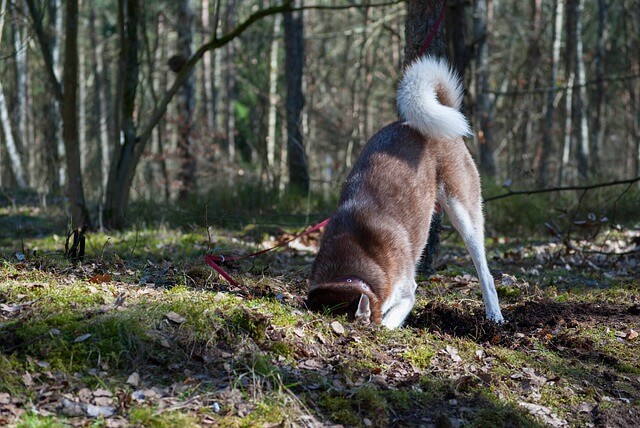Tips to Stop your Dog from Digging

Digging is a normal past time for many dogs, and it is more prevalent in breeds of dogs where digging comes naturally, like terriers. Dogs enjoy digging. We don’t normally enjoy a digging dog nearly as much!
There are a variety of reasons why a dog digs:
- Wildlife: Small animals such as burrowing rabbits or underground moles can be absolutely intoxicating to a dog. They will follow the scent of the animal and dig as much as necessary to try to locate it.
- Heat: Dogs will dig to be more comfortable, and in hot conditions where the dog is left outside, he will likely seek out cooler spots. Dogs often dig out these spots because the spot gets cooler in that depression.
- Escape: Escape artists dig along fence lines in order to escape the yard. This type of digging is always located near exit points.
- Something buried: Dogs will dig when they see something that looks potentially interesting but is partially or fully buried. A common example of this is tree roots, plants, or sprinkler systems.
- Attention: This one seems kind of odd. His digging may not have started for your attention, but if he realizes that you return to him or pay attention to him when he digs, you may find he digs more frequently.
- Boredom: Probably one of the most common reasons that a dog digs is because he is bored and looking for entertainment. Boredom related digging can also incorporate every other kind of digging already mentioned.
7 Tips to Stop Dog Digging
It is important to know why a dog digs. This makes it easier to devise a plan to help eliminate the digging. There are a few solutions that will help in most cases of digging, but you may need to implement additional strategies, depending on the type of digging. Here are some tips:
- Create exercise and play routines. Dogs don’t generally get enough exercise if just left in the yard to play. Most dogs don’t really do that much when left in the yard. Especially for younger dogs, a good exercise routine each day helps reduce excess energy and limit boredom. Dogs also need mental stimulation, therefore they should get plenty of play time. Try rotating toys often, playing games and even enrolling him into an obedience or agility class.
- Supervise. If a dog has established a digging habit, he can’t be left alone in the yard until the habit goes away. Only supervision will ensure that he doesn’t actively dig, so in the beginning at least, someone should be in the yard at the same time as him. Combine play sessions in the yard with active walking or other exercise for best results. If he attempts to dig when you are supervising him, redirect his focus onto a more appropriate activity like chasing a ball. Make sure to teach your dog a Leave It command, which asks him to remove his attention from whatever it is currently on, and a good Come command. These two commands can help gain more control of him and help redirect his focus.
- Create an acceptable digging area. This could be a small digging pit made of a plastic child’s pool filled with loose dirt or sand. You can place toys partially buried in his digging pit and show him the area. Once he gets the hang of it, he can express his digging urge in this okay location.
- Make other areas off limits for him. Consider whether decorative fencing can be used around plants or other off limits spots. Additionally, motion activated devices can startle and interrupt his digging behavior. Some have alarms that sound and others can be hooked up to the garden hose and once motion is detected, your dog will be sprayed with water. These aren’t mean to scare the dog. Rather, they are used to interrupt the undesirable behavior and help him avoid these areas.
- Prevent escaping behavior. If you can make the act of digging less successful or satisfying, this is definitely one thing you should do. For expert escape artists, make it impossible for him to do so. Bury a fence line up to 12 inches under the soil. Attach this to your existing fence, and in doing so, you’ve created a barrier most dogs will tire of before getting out.
- Make the holes less fun to dig in. Try placing a layer of rocks in the hole and cover with a patch of wire fencing, like rabbit or chicken wire. Secure with a few rocks on top and then cover with soil. This can stop repeat offenders since it doesn’t feel as good to dig in the spot anymore.
- Implement distractions. Instead of having the yard just be a hang out spot, try to make it a different feel entirely. You are already having play sessions with your dog, but how about inviting a friend’s dog or neighbor dog over for play dates, assuming this is something your dog would enjoy. It’s hard to think about digging when you’re busy playing!
Although digging can be a frustrating habit, with a little work, it can be overcome.
